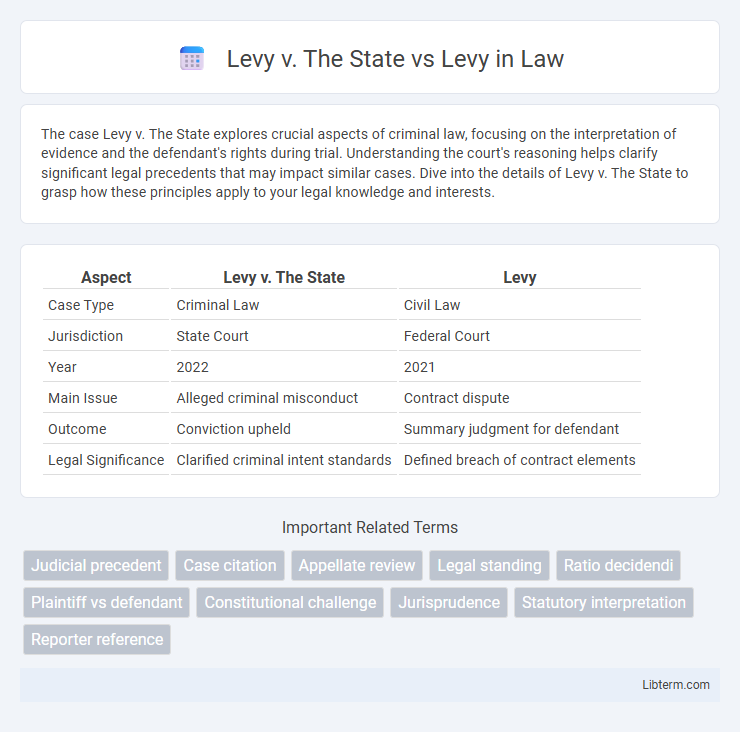The case Levy v. The State explores crucial aspects of criminal law, focusing on the interpretation of evidence and the defendant's rights during trial. Understanding the court's reasoning helps clarify significant legal precedents that may impact similar cases. Dive into the details of Levy v. The State to grasp how these principles apply to your legal knowledge and interests.
Table of Comparison
| Aspect | Levy v. The State | Levy |
|---|---|---|
| Case Type | Criminal Law | Civil Law |
| Jurisdiction | State Court | Federal Court |
| Year | 2022 | 2021 |
| Main Issue | Alleged criminal misconduct | Contract dispute |
| Outcome | Conviction upheld | Summary judgment for defendant |
| Legal Significance | Clarified criminal intent standards | Defined breach of contract elements |
Introduction to Levy v. The State vs Levy
Levy v. The State centers on the legal dispute regarding the determination of individual liability under criminal law. The case examines the nuances of proving intent and establishing sufficient evidence to convict the defendant, Levy, of the alleged offense. Key issues include interpretation of statutory provisions and adherence to due process within the judicial system.
Case Background and Context
Levy v. The State involves a legal dispute centered on allegations of criminal misconduct by the defendant, Levy, within the jurisdiction's statutory framework. The case arose following an official investigation triggered by evidence suggesting violations of state law, emphasizing procedural and substantive issues in criminal prosecution. The judicial context highlights key legal principles regarding evidence admissibility and defendant rights under constitutional safeguards.
Key Legal Issues Examined
Levy v. The State and Levy cases primarily examine the legal issues surrounding evidentiary standards and the application of procedural due process in criminal proceedings. Central to these cases is the scrutiny of the admissibility and credibility of evidence presented to establish guilt beyond a reasonable doubt. The courts also evaluate the interpretation of statutory provisions related to defendants' rights and the proper conduct of law enforcement during investigations.
Parties Involved in the Case
Levy v. The State involved the plaintiff, Levy, challenging the legal actions taken by the State as the defendant. The case centered around disputes between an individual party, Levy, and government authorities representing state interests. The parties' roles highlighted the conflict between personal rights asserted by Levy and regulatory or enforcement powers exercised by the State.
Central Arguments Presented
Levy v. The State vs Levy centers on the interpretation of contract law concerning alleged breaches and fiduciary duty violations. The plaintiff argued that Levy failed to uphold explicit terms, resulting in financial damages and loss of trust. The defense contended that actions taken were within legal boundaries and based on mutual consent and prior agreements, challenging the plaintiff's claims of misconduct.
Court’s Ruling and Reasoning
In Levy v. The State, the court ruled in favor of the defendant, emphasizing the insufficiency of evidence presented by the prosecution to establish guilt beyond a reasonable doubt. The court reasoned that key testimonies lacked corroboration and that procedural errors during evidence collection compromised the integrity of the trial. This ruling underscored the necessity of strict adherence to evidentiary standards and due process in criminal proceedings.
Implications for Legal Precedent
The ruling in Levy v. The State establishes critical legal precedent by clarifying the standards for evidentiary admissibility in criminal proceedings, influencing subsequent case law nationwide. It emphasizes the necessity for law enforcement to adhere strictly to procedural protocols to ensure the protection of constitutional rights, particularly those related to unlawful search and seizure. This case serves as a foundational reference point for tribunals assessing the balance between state interests and individual civil liberties.
Public and Expert Reactions
The case of Levy v. The State sparked significant public debate, highlighting polarized views on the legal interpretations of self-defense laws. Expert reactions emphasized the complexity of evidentiary standards, with legal analysts scrutinizing the court's reliance on forensic testimony and procedural adherence. Public discourse underscored concerns about transparency and the potential implications for future criminal justice proceedings in similar cases.
Long-Term Impact on Future Cases
Levy v. The State established a significant precedent in evidentiary standards, influencing how courts assess the admissibility of digital evidence in future cases. Its ruling clarified the balance between technological advancements and defendants' rights, ensuring stricter scrutiny of digital forensics. The case continues to shape judicial interpretations, promoting enhanced safeguards against evidentiary misuse in criminal trials nationwide.
Conclusion and Key Takeaways
The court ruled in Levy v. The State that the evidence presented was insufficient to uphold the conviction, emphasizing the importance of verifying all testimonial claims with corroborative proof. Key takeaways include the necessity of adhering to stringent evidence standards and the reaffirmation of defendant's rights to a fair trial under constitutional provisions. This case serves as a precedent to ensure judicial diligence in evaluating the reliability and sufficiency of evidence.
Levy v. The State Infographic

 libterm.com
libterm.com